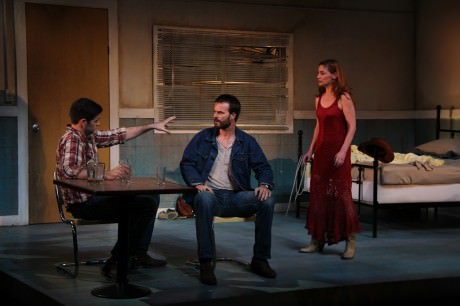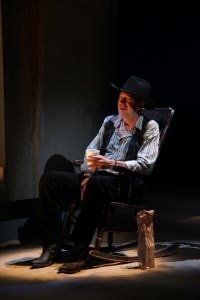Round House Theatre has opened its 2014 season with Sam Shepard’s Fool for Love (1983), one of his many scripts–Curse of the Starving Class (1976), Buried Child (1979), True West (1980) and A Lie of the Mind (1985)–rooted in dysfunctional family life, alcoholism, and fathers who “don’t know their asses from holes in the ground.”

DCMTA’s David Siegel’s review is here.
And why not? London’s Tricycle Theatre opened Shepard’s True West a day ago to positive if not glowing reviews. There’s always space for one of America’s best playwrights.
In a recent Guardian interview inspired by that revival, Shepard discusses American culture and the writers who create it; he says: “The thing about American writers is that as a group they get stuck in the same idea: that we’re a continent and the world falls away after us. And it’s just nonsense.”
Shepard’s no different it seems: “I couldn’t see beyond the motel room and the desert and highway… I couldn’t see that there was another world. To me, the whole world was encompassed in that. I thought that was the only world that mattered. And it’s still there … but now it’s redundant because everything’s replaced by strip malls.”
Fool for Love is that motel room, that desert, that highway as world, that sterling-plated redundancy.
And that “nonsense,” which myopically sucks authors in, is still sucking audiences in as well.
We sit and listen to Shepard’s hypnotic storytelling that could only have been induced by alcohol or peyote or both. We experience his Foolishness and its motel’s incestuous love affair that never ends. We leave wondering why we’ve just spent an hour and a half enchanted by its lassoing cowboys and love-craven women and degenerate fathers. We might even feel slightly ashamed that we want this good looking brother/sister/lover relationship to work out.
We have no answers, and Shepard doesn’t offer us any, not even a cryptic grunt of disapproval or a wink of been-there-done-that. His characters merely exit the stage, leaving us to ponder like an unassuming first date what just happened and why we didn’t leave at the first sign of trouble.
And yet Shepard has achieved his goal: the American mythos has once again convinced us of its importance, its “indispensableness,” its Exceptionalism, even in the face of utter inaneness and emptiness and despair.
In that same Guardian interview Shepard continues: “We’re on our way out, as a culture. America doesn’t make anything anymore! The Chinese make it! Detroit’s a great example. All of those cities that used to be something. If you go to a truck stop in Sallisaw, Oklahoma, you’ll probably see the face of America. How desperate we are. Really desperate. Just raw.”

To be sure, we in DC make almost nothing, but legalese–meaning, we talk a lot–I mean we talk a whole lot. Yet, we are not desperate like those folks in Sallisaw. Why? Because in our world that “talk” is expensive, like $500 an hour expensive (hell, like $1000 or $2000 an hour expensive) and the “heads” that are doing the talking are making a killing on the yap, yap, yap.
And, more than anything else, that’s what Fool for Love is: it’s about the yap.
“I thought you were supposed to be a fantasist, right?” the old man in Fool for Love asks the cowboy. “Isn’t that basically the deal with you? You dream things up. Isn’t that true?”
And, of course, it is true of Eddie the Cowboy in Fool for Love, and of Shepard himself. Both make things up and we believe them; and, in so doing, the play becomes an icon of America’s decline, a vision of its social and cultural wasteland, filled with tingling violence, insipid desires, and absent dreams, and all are as incestuous as they are infertile. In fact, any fertility that might sprout in said soil would, like the princes of England past, bare the mark of their depleted gene pool, which in this case is nothing but a motel swimming pool harboring more tumbleweeds than inner tubes.
Yet, Shepard rose up out of that pool, and his celebrity status, ironically formed by his roles as an actor in Hollywood, speak more to America’s absence of substance, to its fantasy self-perception, than to Shepard’s real genius as a playwright.
For Shepard has not been shaped and molded and made pretty by academe; his plays are not the products of MFA programs and their highfalutin paradigms. His characters seemingly walk onto the stage out of a mirage, but a mirage far closer to the wasteland that the West long ago became than any contemporary landscape.
Now, in Shepard’s newest play, Heartless, which I reviewed last year at Contemporary American Theatre Festival (CATF) in Shepherdstown, the decidedly masculinist Shepard left the dead land of the patriarch to explore the murkier, yet possibly more fecund world of matriarchal impulses. For me, the results were wonderful.
So I tripped back to Shepard’s masculinity, to reflect on his original dreamscape dominated by fathers, their sexual peccadilloes, alcoholic breath, rude authority, and the sons they produce.
After all, Sam Shepard was one of my first theatrical loves. In 1979 I directed his Rock Garden (1964) and in 1981 I acted in Tooth of Crime. Those play, like all of Shepard’s scripts, are deeply personal, the way dreams are personal, or might I say hallucinations. Shepard explores the boundaries between what we know and what we believe we know, and like dreams we tend to make up most of both.
And, perhaps, that is why Shepard’s scripts endure: perhaps, we are all fantasists. We make up most of what we know or think we know and, in so doing, know little more than nothing; and that’s the fool in all of us.
Fool for Love plays through September 28, 2014 at Round House Theatre – 4545 East-West Highway, in Bethesda, MD. For tickets call the box office at (240) 644-1100, or purchase them online.






Fine piece of theater criticism. You have located the skip in Mr. Shepard’s recording that we continue to accommodate.